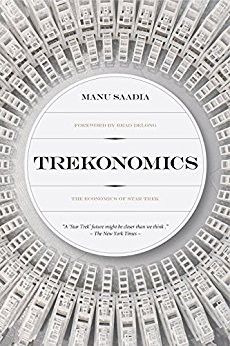
I recently finished listening to the audiobook of Trekonomics: The Economics of Star Trek (Amazon Affiliate Link), by Manu Saadia. It was probably the most fun I’ve ever had thinking about economics, due to the outstanding premise:
What if we treated the Star Trek universe as if it was real, and used it to draw economic lessons about post-scarcity?
By Manu Saadia
The model rests upon one glaring, unavoidable fact of the Star Trek economy: there is no money. There are a few mentions of “exchanging credits” in the TV series, but they all prove to be metaphors, throwback rituals, or jokes. No money means no salaries, no revenue, and no profit. The great majority of the machinery by which capitalism runs is simply gone.
The main reason there is no money in Star Trek is due to the existence of replicators: common household appliances that can, you know, produce virtually anything on demand. Just search through the database of product designs, push a button, and the item you desire will be fabricated, whether it’s a sandwich, a pair of shoes, a hammer, or a diamond.
The existence of replicators means there is no scarcity. And scarcity is the fundamental fact of capitalism: it’s impossible to charge money (much less, a lot of money) for something that anyone can fabricate for free at home. Without scarcity, we no longer need the invisible hand optimizing the allocation of scarce goods. Supply and demand lose all relevance.
But just because there is no money, that doesn’t mean there is no capital. We are used to denominating capital in terms of currency, but there are other forms it can take — tools, machines, and knowledge. Capital is any productive asset that allows labor to turn raw materials into finished products. Even today, estimates of human capital already dwarf all other kinds. In the United States, the value of human capital is five to ten times larger than the value of all physical capital.
Replicators change the nature of capital, which changes the nature of ownership. With replicators, ownership doesn’t yield exchange value. Just because you own something, that doesn’t mean you can benefit from selling it. You may have a replicator in your home, but you didn’t purchase it, and can’t use it to sell products at a premium. It doesn’t save you or make you money. Because again, there is no money.
Since you don’t derive any excess wealth from your home replicator, what is the point of owning it? Ownership means you are responsible for its operation and maintenance. Ownership thus implies service. It actually becomes illogical and inefficient to take the weight of ownership on your shoulders. We are already seeing the beginnings of this today: the sharing economy makes it easier to access cars, bikes, houses, tools, and equipment than to own them. And this is revealing just how much of a bummer it is to own, manage, store, and maintain these things if you don’t have to.
So what is the point of property? Property in Star Trek is mostly sentimental. Its value is subjective and symbolic. The family of Captain Picard, for example, owns an ancestral house and vineyard back on Earth, but they are more like family heirlooms to be treasured, rather than productive assets to be maximized.
We’ve touched on some of the things that don’t exist in the Star Trek economy, but what do they care about then? The central defining question of a post-scarcity economy is: why work? When work is decoupled from bio-physical necessity, what’s the point?
The goal of work in Star Trek is to fulfill the deepest needs of human nature: belonging, love, recognition, purpose, and self-expression. Labor, leisure, and art merge together and become just different flavors of learning, making, and sharing. The purpose of work is to find and express your purpose.
How could such an economy actually work?
The currency that still matters in a post-scarcity economy is reputation. Beating your competitors, producing artistic or scientific breakthroughs, and being known and respected are the greatest rewards. Because even when you have a replicator that can produce anything, one thing remains scarce: positions of authority, leadership, and respect. There is only one Captain Picard.
This too is happening today. Gloria Origgi, an Italian philosopher and researcher, argues that the overabundance of information produced by the Information Age is ushering in the “Reputation Age.” We rely on the opinions and judgments of people we respect to tell us what to think and believe on topics too numerous to research ourselves. The main filter for which opinions to listen to is one’s reputation, which acquires a tremendous power that money can’t buy.
What’s so enticing about this scenario is that reputation preserves the upsides of money — the ability to exchange value and show appreciation — while eliminating its downsides. Reputation is inexhaustible, non-rival, non-excludable, incorruptible, freely given, and freely taken. You can’t bribe, cheat, steal, or force your way into a good reputation, and attempting to will only make your reputation sink lower.
In a reputation-based economy, meritocracy is the highest ideal. The integrity of reputation rests on the foundation of equal opportunity. That’s why any form of stacking the chips in someone’s favor (such as genetic engineering) is strictly prohibited in the Federation. Having genetically enhanced humans would probably produce a lot of value for society, but it would also distract us with a genetic arms race.
With reputation the highest prize, Star Trek society funnels far greater resources into science and research. The problems to be solved and products to be created wouldn’t be only the ones that produce the most profit, but the ones that are most important and impressive. That is, the most complex and risky Grand Challenges. The Federation is able to throw massive numbers of people at any problem, because the supply of trained people is not constrained by poverty or accidents of birth.
But it’s not only large scientific enterprises that will benefit. Consider even a small business: it doesn’t have to deal with the biggest cost, labor, because there is no money to dispense. Employees are self-selected for their passion for the craft, since there’s no other incentive to work. This strongly resembles pre-industrial models of work like apprenticeships, where learning and growth are the primary motivators. A store with a strong reputation will attract the best employees, which will cause it to earn an even better reputation, and so on, in much the same way money allows today.
While services, which can always benefit from a human touch, will thrive, that doesn’t mean no work will be required for products. But that work will move from retail, wholesale, distribution, storage, shipping, supply chain management — all disappeared by distributed manufacturing — to the design of products. Human design and scalability are not at odds, after all. Anything that involves even a small touch from a human acquires tremendous worth, even if reproduced endlessly. Like a Beatles song produced from a stroke of genius, and today residing on millions of devices around the world.
The determinants of value for a product will no longer be scarcity or utility. They will be affect, sentimental taste, personal idiosyncrasies, and craftsmanship. We will need to figure out how to preserve these qualities in continuous flows of information around the world and beyond.
The biggest challenge for every Federation citizen is not how to survive, how to protect their property, or how to make ends meet. Their challenge is how to allocate their time, talents, and capacity for empathy to best contribute to the common wealth. Developing themselves thus becomes inseparable from developing as a civilization.
THE RATIONALIZATION OF KNOWLEDGE WORK
This book shed some light on a paradox I’ve been thinking about: I advocate for creativity and artistry in knowledge work, and yet much of my work seems to be “automating” knowledge work. I seem to be standardizing the ways in which we read, capture ideas, summarize them, organize them, annotate them, and retrieve them.
Saadia observes that these are not at all at odds, but necessary for economic evolution. Agriculture once took the vast majority of humans’ time and energy. Today it makes up a tiny percentage of our economy (1% in the U.S.) and workforce (<2%). And yet we produce far more food at far higher quality than ever before.
Agriculture has been rationalized — made transparent, predictable, largely automated, requiring increasingly less human attention, and shrinking in its contribution to GDP. Economists Robert Solow and Trevor Swan have found in their research that “technology substitution” of this kind drives 80% of all traditional economic growth in the U.S. What is the main contributor to technology substitution? Public investments in education and R&D. We educate ourselves out of simpler forms of work into more complex ones.
Now the same thing is happening to industry, with the rise of intelligent automation. Fewer and fewer workers are required to produce the same output, so they are being displaced.
I believe that even knowledge work is starting to go down this same path. Knowledge work is slowly but surely getting rationalized. It is bifurcating between general knowledge work — the administrivia of responding to emails, organizing files, writing notes, reading texts, and producing documents — and specialized, creative knowledge work that involves solving new problems.
It will increasingly be neither valuable nor profitable to spend the majority of your time on the former. In a winner-take-all economy, even having a shot at winning increasingly requires relying on systems of all kinds to absolutely minimize the burden of general knowledge work. That includes systems of habits and routines, heuristics and frameworks, physical affordances and digital tools, mental models and framings, and techniques and strategies.
Thus framed, my job is to help knowledge workers rationalize their own work before it gets rationalized for them. To help them automate and systematize the simplistic tasks, so they can dedicate increasingly greater amounts of time and attention to the frontier of creativity.
Follow us for updates on Twitter, Facebook, Instagram, LinkedIn, or YouTube.
The Only Subscription
You Need to
Stay at the
Edge of AI
The essential toolkit for those shaping the future
"This might be the best value you
can get from an AI subscription."
- Jay S.
Join 100,000+ leaders, builders, and innovators

Email address
Already have an account? Sign in
What is included in a subscription?
Daily insights from AI pioneers + early access to powerful AI tools








Comments
Don't have an account? Sign up!